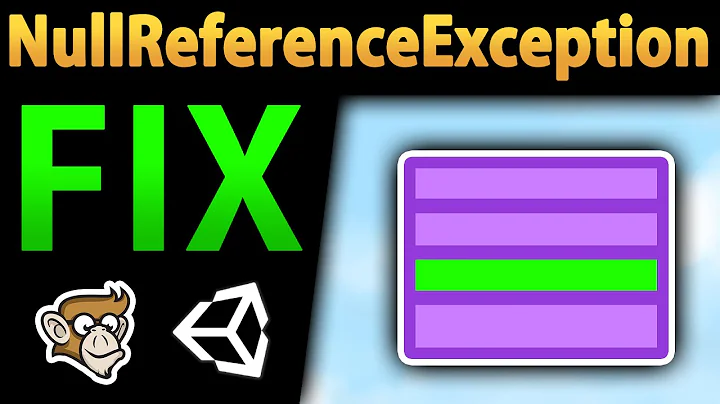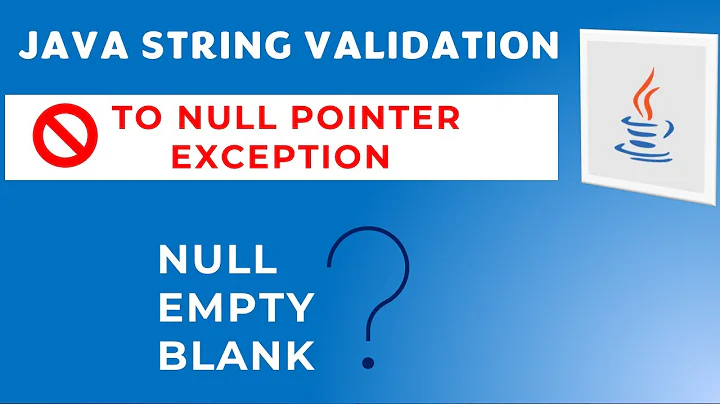Correct exception for an empty\null string passed to a constructor
Solution 1
I suppose the most correct implementation would be this:
if (bar == null) { throw new ArgumentNullException (...); }
else if (bar.Trim() == "") { throw new ArgumentException (...); }
but we might be straining a gnat and swallowing a camel. It's probably not terribly important.
On the other hand, you could build the StringNullOrEmptyException class.
Solution 2
One very common way of handling situations like this is to throw two different exceptions - one for the null, and another one for the invalid non-null string:
if (bar == null) {
throw new ArgumentNullException("bar");
}
if (string.IsNullOrWhiteSpace(bar)) {
throw new ArgumentException("bar");
}
Since you mentioned other exceptions, here is what they signify:
-
ArgumentNullException- Indicates that the argument in question isnull -
ArgumentException- Indicates that the argument in question is not null, but is otherwise invalid. -
InvalidOperationException- Indicates that the operation cannot be performed in the current state of the object. -
TypeInitializationException- Indicates that the type (not an instance of the type, but the type itself) cannot be initialized.
The first three exceptions from this list always indicate a programming problem on the side of the caller, i.e. callers receiving them know that they must fix their code, because they are calling your API incorrectly.
The last exception indicates a programming problem on your side, i.e. the callers receiving this error know that they must call you to fix your error, or reconfigure the way in which they installed your library.
Solution 3
ArgumentException makes the most sense here for the following reasons
-
ArgumentNullException-> not valid because the string could be empty -
InvalidOperationException-> it is not an operation that is failing, it is an argument in a constructor
If you really really want a StringNullOrEmptyException, you can create it yourself but most tend to agree that one should stick to the system defined Exceptions
Related videos on Youtube
Comments
-
BanksySan almost 2 years
I have a class:
class Foo { public Foo(string bar) { if (string.IsNullOrEmpty(bar)) throw new Exception("bar must not be null or empty."); } }What is the most correct exception type to throw?
Viable candidates are:
ArgumentNullExceptionArgumentExceptionInvalidOperationExceptionTypeInitializationException
My instinct is to go with
InvalidOperationException, as the caller is attempting to construct the object in a illegal state, thoughArgumentExceptionhas merits as well.I wish there was a
StringNullOrEmptyException, wouldn't that be great?Edit Thanks for the suggested question, it is similar, but I was asking specifically about it happening in the constructor and whether that would change the recommendation at all.
-
Thomas Levesque over 10 yearsWhat makes you think TypeInitializationException would be adequate here?
-
Thomas Levesque over 10 yearsBTW, if you want a StringNullOrEmptyException, you can go ahead and create it ;)
-
BanksySan over 10 yearsI know I could make one, but I don't want to.
-
BanksySan over 10 years@ThomasLevesque My thinking was as
The exception that is thrown as a wrapper around the exception thrown by the class initializerthat it was sort of initializing (I know initializers are not this bit I wanted to note all the candidates.) -
 Admin over 10 yearsI like the answer in this older question.
Admin over 10 yearsI like the answer in this older question. -
BanksySan over 10 years@hvd I considered an extension method as well... Could well be the neatest solution... Really though, if I were doing that then I think I'd prefer a "Should not be null or empty" exception.
-
BanksySan over 10 yearsI agree it might be a tad overly pedantic, but it is niggling at me. Knowing me, it will continue to do so for a few days (cough weeks)
-
 sab669 over 10 yearsWhy should one shy away from custom Exceptions? Just due to their innate lack of documentation and "familiarity" to other developers who might work on or inherit the application?
sab669 over 10 yearsWhy should one shy away from custom Exceptions? Just due to their innate lack of documentation and "familiarity" to other developers who might work on or inherit the application? -
 David Pilkington over 10 yearsMaintainability is usually the main issue. Documentation is one of the few skills that developers actually work on so it is often left to the end or even forgotten
David Pilkington over 10 yearsMaintainability is usually the main issue. Documentation is one of the few skills that developers actually work on so it is often left to the end or even forgotten -
BanksySan over 10 yearsGood point on 4! 3 would be perfect, except that the object technically doesn't exist yet, but the caller is attempting to put it in an illegal state.
-
Sergey Kalinichenko over 10 years@BanksySan
ArgumentExceptionand its subclassArgumentNullExceptionare designed for situations when objects do not exist. -
 Imre Pühvel over 5 yearsThe mentioned meaning on
Imre Pühvel over 5 yearsThe mentioned meaning onArgumentExceptionis incorrect, the class descriptions states "The exception that is thrown when one of the arguments provided to a method is not valid.".ArgumentNullExceptionis a specific subcase ofArgumentException.











